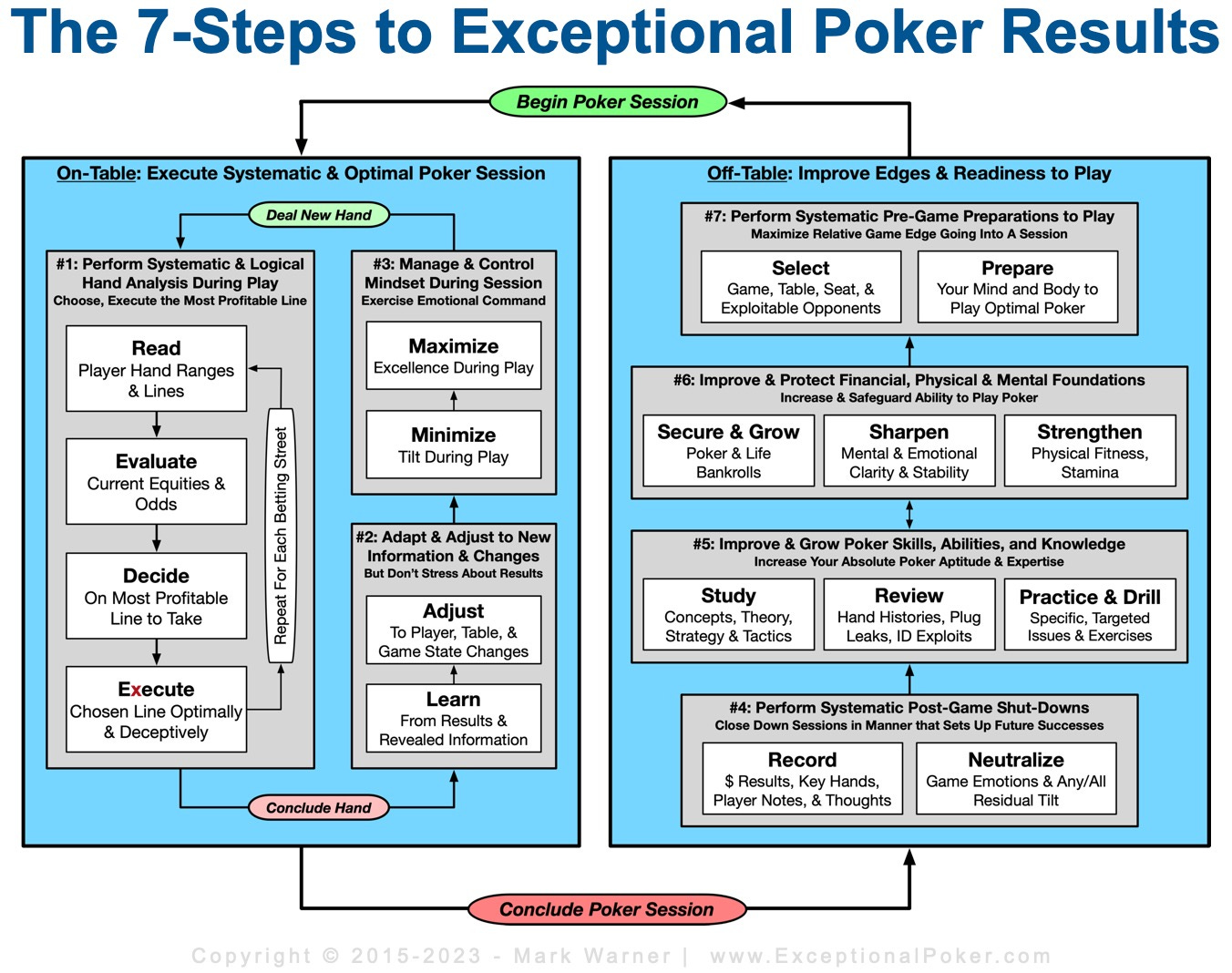The 7 Steps To Winning Consistently at Poker
A Systematic On- and Off-Table Approach Is The Secret to Exceptional Results
“You do not rise to the level of your goals. You fall to the level of your systems.” —James Clear, Atomic Habits
Whether you play poker for fun or as a profession, your aim is to win. However, achieving consistent success in the game is no simple task. It requires a combination of skill, strategy, discipline, and a winning mindset. In this blog post, I will delve into the seven primary elements that separate winning poker players from their losing counterparts.
As someone who has coached, written, taught, and played poker for decades, I've accumulated extensive knowledge and experience on the subject. I've read most of the serious works on poker, have watched countless hours of professional players' training videos, and have played millions of hands of poker myself, ranging from micro- to high-stakes. I've been coached by a variety of winning professionals, and I have coached hundreds of students of my own.
One thing that has always stood out to me when comparing losing and winning players is that the latter have what I call "complete" games. The best players in the world approach poker from a holistic standpoint, both on and off the tables. They constantly refine their fundamental skills and abilities, maintain strong study habits, manage their bankrolls effectively, and do everything else within their powers to maximize their profits.
Winning players strive to have no significant holes in their game. They may not excel at any one particular poker skill, but they aim to be highly well-rounded and to consistently execute all the techniques necessary to dominate the game. They don't avoid nor neglect any aspects of the game because it’s too difficult to learn, not interesting, or because they feel they have already mastered a particular skill set. Rather, long-term winning players view poker as a disciplined vocation, treating it as a kind of calling that requires constant vigilance and never-ending improvement. By doing so, they leave nothing to chance. Sure, it’s tautological to say, but winners are complete poker players because winning poker requires a complete game approach.
The Seven-Step Lifecycle of a Winning Poker Player
Successful players view poker as an ongoing cycle that spans both on- and off-table periods of time. They implement specific, well-considered strategies and tactics on the felt to make the best decisions possible in every hand played. But their work doesn't end when they leave the table, too. Instead, they continue to engage in discrete, pre-determined activities and actions off the table to improve their overall edges and increase their likelihood of winning when they return to the game.
Over the years, I’ve identified seven key things, or steps, that winning poker players consistently take in their journey to maximum poker profits:
Systematic Hand Analysis & Logical Decision-Making. Winning poker players use a systematic approach to analyze their hands during play and arrive at the best possible decisions to take. They evaluate their hand strength, position, and the actions of their opponents logically. They consider the pot odds, implied odds, and equities their current and future situation in a hand. They then focus on deciding on—and acting upon—the maximum expected value, or +EV, path based on the available information and their analysis of that data. The best players understand the concept of range analysis and the power of mathematics. They use this information to make informed decisions and gain a consistent edge over their opponents.
Constant Adaptation and Adjustments During Play. Winning poker players are constantly adapting and adjusting during a poker session. They observe their opponents' tendencies and adjust their strategy accordingly. They are flexible in their play style and can switch from an aggressive to a passive approach, depending on the situation. Likewise, they adjust their bet sizing and bluff frequency based on their opponents' playing style, and how those players are adapting to them. As players come and go from the table, and as those players are making their own adjustments to changing table dynamics, the best players are striving to stay 1-2 steps ahead. They approach adaptation and change in a proactive manner that maximizes their edge.
Mindset Management. Winning poker players understand the importance of a calm and rational mindset during play. They avoid tilting and maintain a decision-based and focused mentality. They have a positive attitude and maintain a healthy balance between confidence and humility. Not only that, but they understand that poker is a game of variance, and even the best players dealt the best cards will experience losses. And they don't let those losses affect their decisions. They maintain a long-term perspective, knowing that individual results don’t matter, but making good, +EV decisions do.
Systematic Post-Game Shutdowns. Winning poker players exit their games—winning or losing—by following a prescribed shut-down process. They record their results and use this data to adjust their strategy and tactics. They update their notes on their regular opponents, capturing important habits, tendencies, and tells for use in future sessions. And they eliminate any residual tilt with techniques like post-game journaling and de-stressing exercises. The best players understand that their next session begins by systematically shutting down their last session in an effective and efficient manner.
Off-Table Learning and Skills Development. Winning poker players invest time to learn and strengthen their skills when away from the tables. They study the game through books, videos, and online forums. They discuss hands with other players, join coaching cohorts, and seek feedback on their play. They also analyze the games of other players, incorporating winning strategies into their game and identifying weaknesses to avoid. Winners understand that there is always room for improvement and they strive to become the best player they can be.
Improvement and Protection of Poker Foundations. Winning poker players better and safeguard their financial, physical, and mental well-beings. For instance, they proactively manage their bankrolls. They take care of their physical health by getting enough sleep, exercising regularly, and eating a healthy diet. They also schedule breaks from the game to prevent burnout and maintain their mental focus. Winning poker players also prioritize their mental health by managing stress and anxiety. They have a system of friends and family to provide emotional support and maintain a healthy work-life balance. And they strive to improve mental acuity and performance via mediation, mindfulness, and a variety of brain activities and exercises.
Systematic Pre-Game Preparations. Finally, poker players perform systematic pre-game preparations prior to sitting down to play. They plan their session in advance and set goals for their game. They review their notes and previous hand histories to prepare for their specific opponents at the table. They take care of practical matters such as ensuring their equipment is in working order, having sufficient funds for their buy-in, and arriving at the casino or online poker site on time. And of course they exercise effective game, table, and seat selection prior to play.
The Bottom Line:
Winning poker players possess a complete combination of skills, strategy, discipline, and a winning mindset. They use a systematic and logical approach to hand analysis, adapt to new information and changes at the table, manage their mindset during a session, perform systematic post-game analysis, consistently learn and elevate their skills, improve and protect their foundations, and perform effective pre-game preparations.
By incorporating these seven key elements into your game, you can increase your chances of winning consistently and achieving long-term success at the game of poker. If you want to transition from losing (or even break-even) play to consistent, exceptional winning, you must ensure your game is “complete” with all seven of the aforementioned elements. Goals are important, but they’re not enough. You need a logical & systematic approach to the game. These seven steps are the building blocks of complete-game winners.




Very good concise synopsis. The ingredients that I struggle with is time and the desire to do other things like writing books and music, while also keeping a job. I know I will never be a great poker player because in doing lots of different things, I will never take enough time for mastery. But i do study and love the game. I do better than breaking even and have fun